Dear So-called Average Teacher
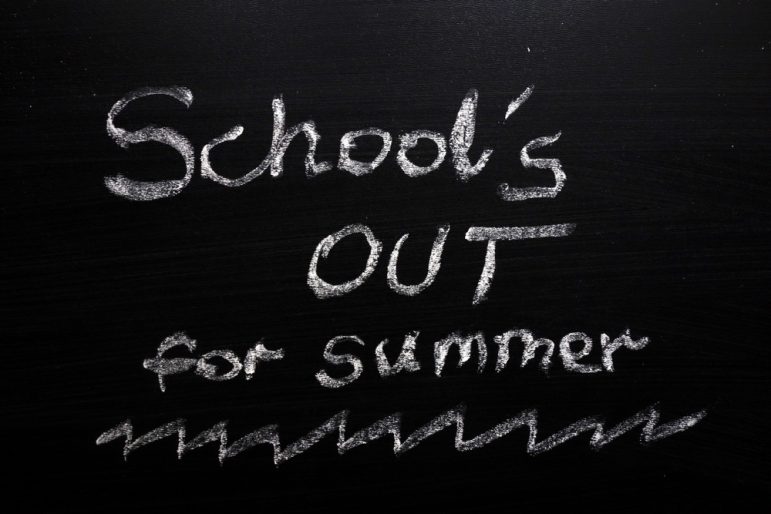
By Julie Holderbaum, Minerva EA/OEA
Now that summer is here and you have time to breathe and reflect on the school year that just ended, maybe you’re feeling that your year was just, well, average.
If each year of your career is a song on an album, there are a number of reasons why this past school year isn’t going to make it to your greatest hits compilation.
Maybe you had a challenging schedule, a new prep or a new grade level. Perhaps you had a group of kids who didn’t work well together, or who were less academically capable than previous groups.
Maybe you had to learn how to work with a new colleague very closely, which even in the best of circumstances is a stressor. Maybe you lost your best teaching buddy to another school or district, the one whose room you could walk into, shut the door, and say, “You won’t believe the day I had” and vent your frustrations with no worry of judgement.
Maybe there was an administration change in your building that didn’t go smoothly.
Maybe your students confided in you more than usual and you know who has probation officers, pregnant girlfriends, and neglectful or abusive home situations. You know who is having sex and who is drinking on the weekends and who is bouncing from one friend’s couch to the next since there is nowhere else to live. Frankly, what you know about your kids’ personal lives is a heavy burden that weighs on you at school and does not dissipate just because you walk through your own front door at the end of the day. In fact, it gets heavier when you look around at your healthy family and your safe, comfortable home and your belongings that would be luxuries to so many of your students.
“Stress is stress and it doesn’t always stop and start as we move between home and school.”
Perhaps you had a particularly stressful personal year. You went through a breakup, or your child started driving or dating, or everything that could break in your house, broke. Maybe a loved one passed away unexpectedly, or maybe you watched someone you love die a slow death, and even though you had time to say goodbye, it still hurts deeply. Either way, grief can wash over you like a tidal wave, soaking every part of your life, even when you’re at school. Personal stress affects who we are in and out of the classroom, and professional stress impacts our personal lives as well. Stress is stress and it doesn’t always stop and start as we move between home and school.
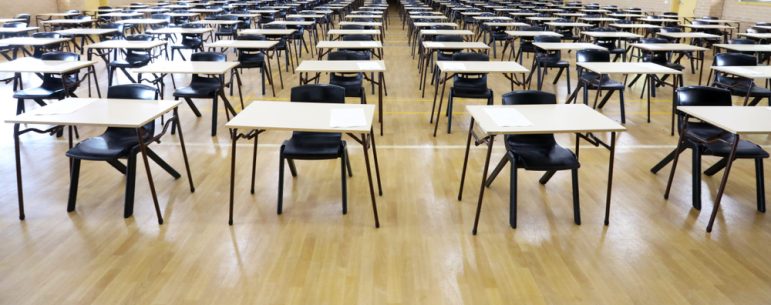 Maybe you feel like you didn’t do enough to support your profession this year.
Maybe you feel like you didn’t do enough to support your profession this year.
You didn’t rally at the statehouse, you didn’t email or call one single legislator, and you didn’t go to union meetings.
Social media alone bombards you with reasons to do all of those things, especially in Ohio, and it can be completely overwhelming to try to keep up with all the reasons we have to be activists, let alone make time to take action.
And then maybe you looked around and saw teachers who can do it all.
Nothing average about them, not this year or any year.
They advocate fiercely and ceaselessly for public education, create new ways to teach old material that inspires students and garners positive attention from administrators, and they balance work and school stress with aplomb. They have boundless energy, unlimited ideas for positively impacting kids and schools, and good days far more often than bad. They reap the rewards of their efforts with outstanding test scores and any number of teacher awards or honors. They are resilient and resourceful and recognized, and THEY ARE CHANGING THE WORLD while you are just trying to get through the day and the faculty meeting at the end of it.
Listen. Those teachers don’t exist. Some people fake it better than others, but we all have work stress that weighs on us, problems that can’t be solved with a new lesson plan. We all have personal lives that involve some broken hearts and broken appliances. We all recognize the value of the work of the OEA to help teachers advocate for our students and our working conditions, but we can’t be Norma Rae standing on a table holding high a sign that says UNION every day. After all, it’s hard to teach while holding a sign and standing on a table.
True, it’s important to strive toward professional success and to have compassion for our students, even if their stories weigh on us. It’s important to have rich personal lives, even if they are, at times, painful. It’s important to fight for public education, even though the battles can be exhausting.
But it’s equally important to recognize that no one can excel at every part of life for any extended period of time. For various reasons, we have years that are simply average, probably more often than not. You know why there are movies about Erin Gruwell (Freedom Writers) and LouAnne Johnson (Dangerous Minds). Because teachers like that, as wonderful as they are, are anomalies. Most of us never reach those heights and no one expects us to.
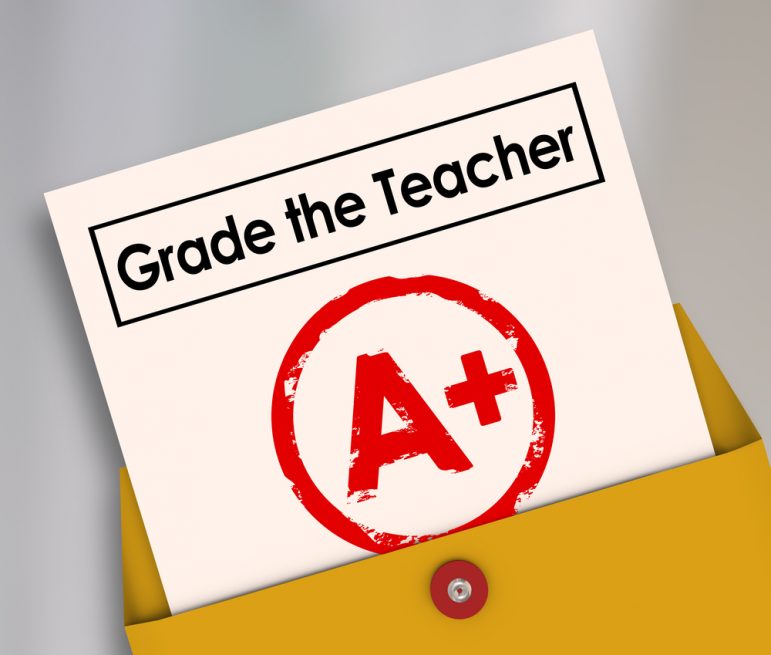 Dave Stuart Jr., in his excellent book These Six Things, articulates this concept so well: “We are never finished becoming the teachers we hoped we’d be when we first set out.”[1]
Dave Stuart Jr., in his excellent book These Six Things, articulates this concept so well: “We are never finished becoming the teachers we hoped we’d be when we first set out.”[1]
The key is in the phrase “never finished”. Maybe you had an average year, for whatever reason. But think back to your first years of teaching. Are you better now than you were then? Most likely you are. There is no guarantee that we will one day be adorned with accolades and gold medals for teaching greatness. However, if we continue to strive to have a positive impact on the kids who walk into our classrooms every year, I think we are doing the job right.
We don’t always see, in immediate hindsight, the seeds that we have planted and the impact that we have had. During your “average” year, you may have unknowingly made one comment that turned around a student’s perspective on your subject area or even on his life.
I am admittedly biased, but I think a teacher who does an “average” job is still doing superhuman work that most people outside of education could not handle for a week, and even our average work can have a significant positive outcome on someone’s life.
When I became an educator, my high school government teacher told me that one of the blessings of teaching is that there are so many starts and stops. In no other profession are there so many built-in chances to begin again, whether it’s after a long weekend or at the dawn of a new school year.
So enjoy this momentary stop. Take a well-deserved rest. Appreciate the time to reset and rejuvenate. Reflect on the year that ended but look forward with hope to the year that is coming and the opportunity to continue working to be the teacher you set out to be when you first started. And then, in a few months, begin again.
[1] “These 6 Things – Dave Stuart Jr..” https://davestuartjr.com/these-6-things-how-to-focus-your-teaching-on-what-matters-most/. Accessed 13 Jun. 2019.
— Julie Holderbaum is an English Instructor and an Academic Challenge Advisor at Minerva High School, Minerva, Ohio.
Blog: The Antidote to Despair
By Julie Rine is an English Instructor and an Academic Challenge Advisor at Minerva High School, Minerva, Ohio.
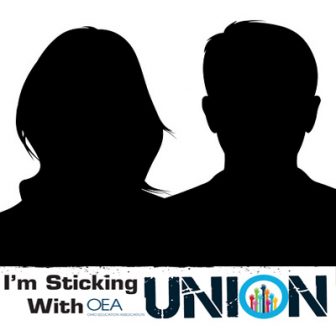 It’s easy to feel hopeless and overwhelmed right now, isn’t it? The Supreme Court’s decision regarding the Janus case, while not unexpected, still stung. The move by the Court has the potential to weaken unions, many sources say, and the decision has even been referred to as a “crippling blow” .
It’s easy to feel hopeless and overwhelmed right now, isn’t it? The Supreme Court’s decision regarding the Janus case, while not unexpected, still stung. The move by the Court has the potential to weaken unions, many sources say, and the decision has even been referred to as a “crippling blow” .
There are certain unfortunate situations in life that we can’t control, and it’s important to recognize those and let them go rather than devote energy to a state of affairs that cannot be changed.
There are also situations in life that we CAN impact, with our actions, our words, our advocacy, but even in those situations, there are moments when you have to let go, politically, personally, emotionally. You have to take a break, look away, check out, turn off the news and turn on a Friends rerun, lose yourself in a good book, take a few deep breaths and decide to let go and let someone else take up the cause for awhile. Those “let go” moments are critical to maintaining good mental health and restoring energy to jump back into the fray when we are refreshed and ready to go.
But this is not one of those times. This is not a “let go” moment. This is a “Let’s Go” moment.
The media would have you believe that the Janus ruling will lead to fewer union members which means a reduction in funds which equals unions cutting jobs and services and benefits. If you believe the news, soon our teacher unions will be so weak and ineffective that teachers will not be able to influence an impressionable kindergartner, let alone legislative policies.
Don’t believe the hype.
If anyone is equipped to turn a bad roll of the dice into an opportunity to change the game, it’s teachers.
On a daily and weekly basis, we think on our feet, we adapt to a snag in the routine. We reflect on what worked and what didn’t and make adjustments in the three minutes between classes, a task that would take Congress three months. We take on whatever challenges exist in our communities and in our classrooms and we overcome them. We don’t stop there, either. Most of the time, we not only overcome the challenges we face, challenges which can change from year to year and week to week, (sometimes even minute to minute!), we create new programs, new methods, and new realities that are often more effective for our students than what existed before the obstacle presented itself.
I don’t care what your political leanings are, if you are a teacher, you rival only parents in your fierce desire to protect kids and prepare them to succeed in the future.
The union helps us do just that. Through the union, we can fight for what our kids need to succeed, such as smaller class sizes, adequate and up-to-date academic resources, onsite counselors and mental health professionals, and a safe environment in which to learn. The union also helps us fight for what teachers need to help students succeed, such as adequate planning time, meaningful professional development, continued opportunities for further education and training, sufficient time to work as teams to tackle problems rather than as isolated instructors behind our classroom doors, and yes, a fair salary which allows us to focus fully on our students and our own families instead of squeezing in hours away from both while we work a second job to make ends meet. The trickle-down effect here is obvious; when teachers lack support and resources, kids lose the effective education they deserve.
So what can we do?
The decision will not be reversed, and even worse, it appears that a new Justice will be seated who may have equally damaging views of unions and public education.
First, we must remember that Supreme Court Justices are not the only ones allowed to issue opinions. We can write letters to the editor of our local papers, and we can routinely call or write our elected officials to make our voices heard and our opinions known.
Secondly, we can actively recruit members, especially young teachers, to not only join the union, but to become active in the union. Retaining or gaining members will of course help the union financially, since our dues dollars provide us with the resources and training necessary to be effective advocates for our students. But we don’t just need the dues money. We need active and energetic members, more than ever before. Money talks, but members act.
Thirdly, we can help register new voters. If we want a future in which citizens are active participants in the democratic process (whether they are on “our side” or not), then we must emphasize the importance and value of our right to vote, and then take the practical step to register young voters. It is a simple process. There is no reason why every 18-year-old student who graduates from an American high school should not be registered to vote.
 We can’t force them to register, however, so the goal should be to get them excited to register.
We can’t force them to register, however, so the goal should be to get them excited to register.
By teaching our students how to read a variety of sources on any given topic and then to form their own opinion, we help them become critical thinkers. Critical thinkers are often eager to make their positions known, and the most powerful way to do that is to exercise the right to vote. Few moments of my teaching career have been as special to me as when I registered a student to vote and she literally high-fived me and yelled, “I can vote, I can vote!” This is the enthusiasm we must seek to engender in our classrooms.
Perhaps most importantly, we can get involved in local and OEA efforts to elect pro-public education and pro-union candidates. We can work phone banks, canvass door-to-door, talk to our colleagues and friends about why we support certain candidates. We must follow that up by voting for candidates who support us as public school teachers and as union members, up and down the ballot, in local elections, in primaries, in midterms and in presidential elections. These actions are particularly important in Ohio this year, as we will be voting for a senator and a governor.
Political defeats can be discouraging, but nothing feels worse than knowing you could have done more to ensure victory when instead you chose to sit on the sidelines. We must take our frustration and allow it to motivate us to take action.
Sure, the Supreme Court decision is a setback, a challenge to be overcome. But a “blow” to unions? I don’t think so. In fact, I think they might have just poked the beast. Joan Baez said “Action is the only antidote to despair.” So don’t despair. Don’t make this a “let go” moment. This is a “LET’S GO!” moment and I have no doubt that we will persevere and succeed. The teachers’ unions are strong because teachers are strong, and we are stronger when we stand together, as friends, as colleagues, and as proud union members.
![]()
— Julie Rine is an English Instructor and an Academic Challenge Advisor at Minerva High School, Minerva, Ohio.
You Cannot Silence the Voice of Working People
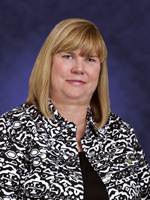
Teaching children is pretty wonderful.
This has been my passion and in the 19 years that I taught, I learned from and have been inspired by my colleagues. I have also been moved by the actions of fellow union members who fought for better wages and safe working conditions.
The energy we are seeing with teachers standing up in the neighboring states of West Virginia and Kentucky and elsewhere as the #RedForEd movement spreads across the country is unparalleled in recent history. Public opinion is with us. A recent poll found that 62% of Americans believe the country is better off with stronger unions.
Yet, while this happening, amid the highest level of support for unions in 15 years, the US Supreme Court in a narrow 5-4, politically-motivated decision ruled that unions – specifically public employee unions — should be weaker. The Supreme Court ruled in the case of Janus v. AFSCME, Council 31 to further tilt the playing field in favor of the wealthy and corporate interests.
The court overturned 40 years of precedent in deciding that requiring so-called fair-share fees to be paid by people who choose not to join a public-sector union but who enjoy the benefits of union representation somehow violates the First Amendment of the Constitution. This doesn’t make sense, and it’s not right.
It also doesn’t make sense that so many people are finding it difficult to get by and provide for their families, no matter how hard they work. It doesn’t make sense that people are more productive than ever, but they’re working longer hours for less money and fewer benefits. And it doesn’t make sense that all this is going on while a handful of very wealthy people have seen their salaries and holdings skyrocket. It is shameful that the wealthy special interests behind the Janus case have succeeded in manipulating the highest court in the land to do their bidding.
"I believe deeply in the power of our collective voice to make sure that every teacher and student has the resources they need to be successful."
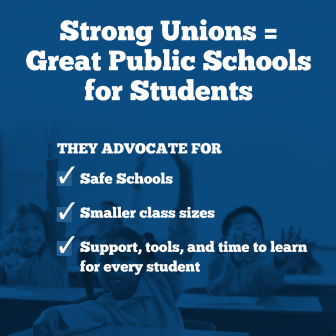
I believe deeply in the power of our collective voice to make sure that every teacher and student has the resources they need to be successful. When unions negotiate for working conditions in the classroom, they also negotiate for the conditions in which our children learn. When our unions advocate for us as educators, they also advocate for the students we serve.
Public service workers-teachers, social workers, firefighters, and nurses are more determined than ever to stick together in their unions. Unions remain the most effective vehicle for the power in numbers needed for working people to secure their rights and freedoms, and they provide a pathway to the middle class.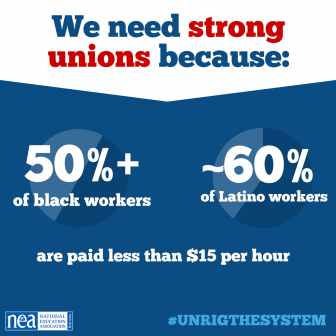
The truth is, when unions are strong, the entire community benefits. Unions use their collective voice to advocate for policies that help all working people — like increases to the minimum wage, affordable health care and great public schools.
Unions help close the pay gap for women and communities of color who have been systematically disadvantaged due to discrimination and prejudice.
African-American women in unions earn an average of $21.90 per hour, while non-union women earn $17.04. When Latinos are members of a union, their median weekly income increases by more than 38 percent.
The wealthy special interests that have benefited from an unfair, unbalanced playing field are now intent on tilting that playing field even more by attacking public-sector unions.
It’s driven by ideological extremists who oppose our basic right to organize. And it’s an attack on more than the men and women who are teachers and custodians and first responders; it’s an attack on anyone who wants to use their voice to fight for something better for their communities.
I have dedicated my life both to helping students and fighting for my community and I won’t back down.
My fellow educators and I are going to continue to speak out and I ask those who feel the same, please join us. Because no great social change — from ending slavery to securing the right to vote for every citizen, to winning the freedom to organize — has been achieved by standing alone.

Becky Higgins
President
Ohio Education Association
Categories
2018 Press ReleasesAbout Voices of Change
Education Support Professional
Higher Education Faculty
Higher Education Staff
Legislative Issues and Political Action
Local Leader
Member Stories
Membership
New Teacher
Non-educator
OEA Member
preK-12 Teacher
Retired Member
Student Member
What's New
Stand Strong for Public Education…Together, We Can!
 Janus v. AFSCME?
Janus v. AFSCME?
Through our union, we advocate for what our students deserve and for what educators need to do our jobs well. However, the U.S. Supreme Court will likely issue a decision in the case this week that could threaten our collective voice. Janus v. AFSCME is a politically motivated attack to use the U.S. Supreme Court to divide and conquer our union by eliminating the fair share fee.
Why Does It Matter
Janus v. AFSCME is part of a concerted effort to weaken our ability to advocate for our students and members. Negotiating collectively improves the lives of all working people—even those who are not union members themselves—because strong unions set pay and benefit standards that non-union employers follow. This means stronger communities. At its core, the Janus case is about working people’s freedom to make a better life for themselves, their families, and their communities.
What Are We Doing About It?
Together, we are continuing the fight for strong public schools by strengthening our locals and demonstrating value and relevance to our members. | #OEAstrong
Download the Strong OEA = Strong Public Schools fact card for additional details about Janus v. AFSCME.
![]()
 Oh Yes, We’re Social — Join the Conversation!
Oh Yes, We’re Social — Join the Conversation!
![]()
Updated June 4, 2018
June 2018 Ohio Schools
-
- COVER STORY:Celebrating School — 20th Annual Create-A-Cover Contest highlights what students like most
- Samantha Conners, grade 12, Hilliard Darby HS
- Tips for welcoming new educators
- Breakfast in the classroom
- Anti-public education interests use Janus case to further their agenda
- Political Action — Cordray for Governor
- 2018 Fiscal Fitness Award Winners
- Updates — Legislative and Retirements
Moved recently? Contact the OEA Member Hotline to update the address on file at 1-844-OEA-Info (1-844-632-4636) or email, membership@ohea.org. Representatives are available Monday-Friday, from 8:30 a.m. to 6 p.m. | OhioSchools — Past Issues

 Oh Yes, We’re Social — Join the Conversation!
Oh Yes, We’re Social — Join the Conversation!
- COVER STORY:Celebrating School — 20th Annual Create-A-Cover Contest highlights what students like most
Ohio Education Association Endorses Cordray for Governor
The Ohio Education Association (OEA) Fund for Children and Public Education (FCPE) has unanimously endorsed Richard Cordray (D) for Governor of Ohio. The vote was taken at an FCPE convention on Saturday, May 19, 2018, in Columbus.
“Richard Cordray displayed an impressive understanding of the key issues that Ohio’s next Governor will face – from the need to invest more in the state’s public schools and less in poor-performing charter schools. He also understands the need to halt the over-reliance on standardized tests to measure student growth and to evaluate teacher performance,” said OEA President Becky Higgins. “He inspired our members with his commitment to make public education a top priority and to enhance universal pre-K programs that will set Ohio’s children on the path to success.”
The OEA FCPE State Council, comprised of elected OEA members from throughout Ohio carefully screens candidates based on their voting records, their stated support of public education and the OEA’s priority issues. The Republican candidate for Governor, Attorney General Mike DeWine, was invited to participate but declined to attend.
“We believe Richard Cordray has the leadership skills to address the many challenges the state will face in the years ahead,” said Higgins. “Educators, students, parents and all Ohioans will be well-served by his election.”
The Ohio Education Association represents 125,000 teachers, faculty members and support professionals in Ohio’s public schools, colleges, and universities.
Ohio Education Association elects new Secretary-Treasurer
Immediate Release

(Columbus) – On Friday, May 11, Mark Hill of the Worthington Education Association, was elected Secretary-Treasurer of Ohio’s largest association of public employees, the Ohio Education Association (OEA).
Hill was elected by OEA’s Representative Assembly, the governing body of the organization. The Representative Assembly is comprised of more than 1,100 elected delegates from local education associations throughout Ohio. Hill will serve a three-year term beginning July 15, 2018. He replaces outgoing Secretary-Treasurer Tim Myers who is term-limited.
Hill is a 30-year middle school math teacher with Worthington City Schools. He has served since 2010 as President of the Worthington Education Association and has been a member of the bargaining team for four contracts. Mark has served as Chair of the Political Action and Finance Committees for Central OEA/NEA and as Chair of the OEA Resolutions Committee. Mark is currently a member of the OEA Board of Directors and is the Chair of the Strategic Priorities Oversight Committee. Mark has served on the board of the State Teachers Retirement System since 2010.
The Ohio Education Association represents 125,000 teachers, faculty members and support professionals in Ohio’s public schools, colleges and universities.
###
Categories
2018 Press ReleasesCommunications and Community Engagement
Education Policy and Governing Bodies
Education Support Professional
Higher Education Faculty
Higher Education Staff
Local Leader
New Teacher
Non-educator
OEA Member
preK-12 Teacher
Representative Assembly
Retired Member
Student Member
Union Business
February 2018 Ohio Schools
Members Only
This content is for OEA members only. If you are a member, please click the button below to log in.
If you are a member but haven't registered before, please click here to register.
OEA Says ECOT Students Will be Welcomed in Local Public Schools
The President of the Ohio Education Association, Becky Higgins, said today that parents who are disappointed by the closing of the state’s largest online charter school, the Electronic Classroom of Tomorrow, should consider their local public schools as a viable option for their children.
“I think parents will find a hospitable environment in local public schools,” said Higgins, “where students are taught by dedicated professionals who care deeply about serving the educational needs of the children in their classrooms. Local public schools provide a stimulating experience for students where they are given every opportunity to reach their full potential. OEA encourages ECOT parents to take a look for themselves.”
The Ohio Education Association (ohea.org) represents 124,000 teachers, faculty members and support professionals in Ohio’s public schools, colleges and universities
Follow OEA @OhioEA on Facebook, Twitter, YouTube, Instagram, and Pinterest.
The Sound of Silence … Worth the Consequences?
 One of the first lessons a child learns in school is to listen and be quiet. Silence is often desired in schools, unless we ask for participation. But lately, I’m beginning to wonder if we are doing our students a disservice when we emphasize the value of silence … because there is also a danger in certain kinds of silence.
One of the first lessons a child learns in school is to listen and be quiet. Silence is often desired in schools, unless we ask for participation. But lately, I’m beginning to wonder if we are doing our students a disservice when we emphasize the value of silence … because there is also a danger in certain kinds of silence.
As part of a study of Art Spiegelman’s Maus books and the Holocaust, my sophomores recently viewed a visual testimony of Kurt Messerschmidt. A young man during the Holocaust, he witnessed German soldiers forcing an older Jewish man to pick up some broken glass from the windows of a destroyed Jewish business on Kristallnacht. He noted that while he and a friend helped the old man pick up the glass, many other people stood by and said nothing. He believes that there were certainly other people who disapproved of the Nazis’ actions, but “Their disapproval was only silence, and silence was what did the harm.”[1] Sonia Klein, another Holocaust survivor who was interviewed after the riots in Charlottesville, warned that “Silence is the first thing after hate that is dangerous, because if you are silent, it’s an approval of what’s going on.”[2]
At the end of the Holocaust unit, I asked my students to read an article about Martin Niemoller[3] and his now famous words about remaining silent when other groups were persecuted and finding no one left to speak out for him when he was targeted. I asked my students how Niemoller’s words might apply today. One girl answered quite simply and succinctly: “We can apply these words to today by not allowing something that we wouldn’t want to happen to us to happen to somebody else.” She makes an excellent point. Maybe it’s not as simple as teaching the Golden Rule (do unto others as you would have done unto you). Maybe it’s time to teach kids to advocate for those being slighted or hurt in our world, even if they aren’t directly involved with the victims or the perpetrators.
In another class this week, my juniors read Walt Whitman’s poem “I Sit and Look Out”[4], a poem in which the speaker gazes out at “all the sorrows of the world, and upon all oppression and shame”. He lists several of those sorrows he observes in the world, including “treacherous seducer(s) of young women,” and “slights and degradations cast by arrogant persons upon laborers, the poor, and upon negroes, and the like.” The poem ends with the line “All these — All the meanness and agony without end, I sitting, look out upon,/See, hear, and am silent.” We discussed why the speaker in this poem (and people in general), upon seeing someone in need, choose silence over speaking out, and choose passive observation over direct action. My students mentioned greed, selfishness, and fear. They also decided that sometimes people may not even be aware of a need, or if they are, they might feel that one person’s actions or words would not make a difference.
My juniors were also familiar with Ralph Waldo Emerson’s belief that “for nonconformity, the world whips you with displeasure,” so I suggested that perhaps another reason people choose silence over action is that they have seen what has happened to others who spoke out. Colin Kaepernick peacefully protested an issue which plagues our society today (and which Whitman wrote about in his poem over a hundred years ago). And for that, Kaepernick lost his job. When other players knelt in solidarity with him, the President chimed in with profanity directed toward those players, critics berated the players who protested, and the news media, for weeks, was centered on this issue, this scandal, started by one man’s peaceful act of nonconformity and civil disobedience intended to speak out against an injustice. Heather Heyer, an anti-racism activist who went to Charlottesville to protest the hatred spewed by white supremacists, paid with her life for her efforts to stand up against an injustice.
So is speaking up worth it? It’s not as safe as remaining silent, that’s for sure, nor is it as easy. There are certainly repercussions that come from speaking our beliefs in “words as hard as cannon balls,” as Emerson implores us to do in “Self-Reliance”, and many of those consequences are not pleasant. But can our society afford to continue sitting by in silence as injustice and oppression happen around us?
Whitman’s poem “I Sit and Look Out” was written in the late 1800s. My students and I realized that of all the sorrows he lists, 13 in total, we still have every single one in our society today, with the exception of famine at sea. What does it say about humanity that over 150 years later, we have not figured out a way to eliminate these man (and woman)-made sorrows from our world? Where has silence gotten us?
As teachers, we can appreciate a quiet classroom, heads bent over desks, the only sound pencils scribbling as our students diligently work on an assignment. But I am going to make certain that in 2018, I make it a priority to teach my students the beauty of using their voices to break inappropriate silence and advocate for others. Maybe we can manage to address at least some of the sorrows that Whitman wrote about all those years ago if we help the next generation be equipped to do more than sit silently by and wait for someone else to take action.


